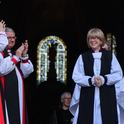The word crowdsourcing was coined by a Wired journalist as recently as 2006, but the practice of tapping into the latent and free talent of the public is more than 150 years old. One of the most famous examples of crowdsourcing was the first edition of the Oxford English Dictionary (OED), established in 1857 and first completed in 1928. People around the world were invited to read their local books and send in their local words on small four-by-six-inch paper slips. There were other crowdsourced projects at the time, but the collection of words for the OED was the largest and most successful. We might call it the Wikipedia of the 19th century.
I have always wondered: how many people volunteered to help the OED? Who were these unsung heroes, without whom the dictionary could never have been written?
Nine years ago, I stumbled across a small black book in the archives of the OED that turned out to be the 150-year-old address book of James Murray, the Dictionary’s longest-serving editor. It listed all the volunteers, the books they read and the number of slips they sent in.
Hence, we now know that 3,000 people took part in the project, from America and Australia to India and Japan. Some were serial “crowdsourcees” for whom the OED was not their only mission. A young mother in Kent, for example, collected both words for the OED and rainfall measurements for the British Rainfall Organisation, which helped in weather forecasting. A Norfolk vicar contributed plant names (with a sideline in fungi) for the OED, and also collected flowers for a project run by the Botanical Society of London.
I tell the story of these, and many other, unsung heroes of the OED—from suffragists to pornographers, murderers (yes, plural) and queers—in my new book, The Dictionary People. They were an eclectic bunch overall, and not necessarily who you might expect. The majority were not part of the scholarly elite but rather outsiders, amateurs and autodidacts for whom participating in a project attached to a prestigious university gave them a sense of access otherwise denied to them.
The OED has a bigger staff now, but it still receives contributions from the public. It recently launched a new website which is a treasure trove of information about words and the English language. Search for a word and receive a handy summary of meanings, graphs about usage and—my favourite feature—a “contribute” button on every entry, allowing you to send feedback to the editors. The medium may have changed since the handwritten slips, but the role of the public is still valued. Kudos to the editors of the Dictionary for continuing to value that important crowdsourcing tradition.














